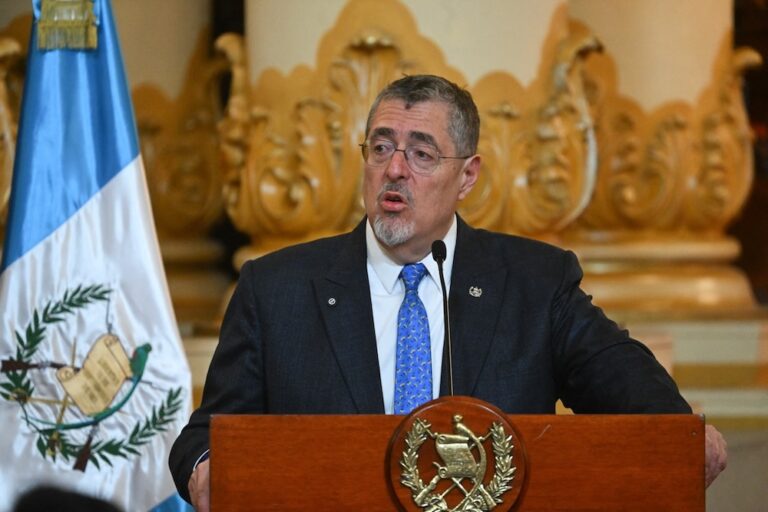(IAPA/IFEX) – The following is a 4 December 2001 IAPA press release: The IAPA rejects new law in Guatemala that restricts press freedom Alfonso Portillo urged to veto law and keep his promise to honor the principles of the Declaration of Chapultepec that he signed on September 5 Miami (December 4, 2001) – The Inter […]
(IAPA/IFEX) – The following is a 4 December 2001 IAPA press release:
The IAPA rejects new law in Guatemala that restricts press freedom
Alfonso Portillo urged to veto law and keep his promise to honor the principles of the Declaration of Chapultepec that he signed on September 5
Miami (December 4, 2001) – The Inter American Press Association (IAPA) today made public its concern and rejection of a new law on mandatory licensing approved recently in Guatemala that restricts freedom of the press by eliminating the constitutional right to freedom of thought.
The Law of Obligatory Licensing was backed by representatives of the Guatemalan Republican Front and approved by majority vote on November 30. Although it is a general piece of legislation that affects different professional associations, it specifically eliminates Article 35 of the constitution that establishes “freedom of thought through any medium” and that “this constitutional right cannot be restricted by law or any government regulation.”
IAPA President, Robert Cox, described the new legislation as “contradictory and anti constitutional”, which “directly attacks the most sacred freedom of the people, their freedom of expression, tearing it away from its own constitution, something that Guatemalans have held on to despite many abuses by dictatorial governments and many years of civil war.”
“Once again,” stated Cox, assistant editor of The Post and Courier newspaper, Charleston, South Carolina, “we see how legislators try to hinder journalists and the press in general without caring that in the meantime they are violating the rights and guarantees that belong to each and every one of the Guatemalan people.”
Rafael Molina, chairman of the IAPA’s Committee on Freedom of the Press and Information, declared that the mandatory licensing of journalists violates Principle 8 of the Declaration of Chapultepec, which establishes that membership in trade associations should be strictly voluntary. The declaration was signed by current President Alfonso Portillo last September and also in 1994 by then President Ramiro de Leon Carpio.
Molina, editor of Ahora magazine, Santo Domingo, Dominican Republic, said that the mandatory licensing of journalists restricts the freedom to seek, receive and impart information and ideas of all kinds, as well as infringes on the right of all others to receive information without obstacles. Molina referred to the Advisory Opinion of the Inter-American Court of Human Rights, which in 1985 concluded that the compulsory licensing of journalists was incompatible with freedom of expression as outlined in Article 13 of the American Convention on Human Rights of 1969.
At that time, the court stated that “freedom of expression is a fundamental right of every human being in and of itself, whose practice cannot be restricted nor conditioned through any kind of requirements that he or she does not want to follow.”
Cox and Molina likewise expressed hope that the new law will be vetoed or modified – at least those parts that negatively affect freedom of expression and of the press – so that Guatemala continues to uphold Article 35 of the constitution and international treaties.
The IAPA’s highest authorities remind Guatemalan President, Alfonso Portillo, that he signed the Declaration of Chapultepec, on September 5, in front of a prominent international IAPA delegation where he promised to honor and respect the principles of freedom of the press and of expression contained in the declaration.


